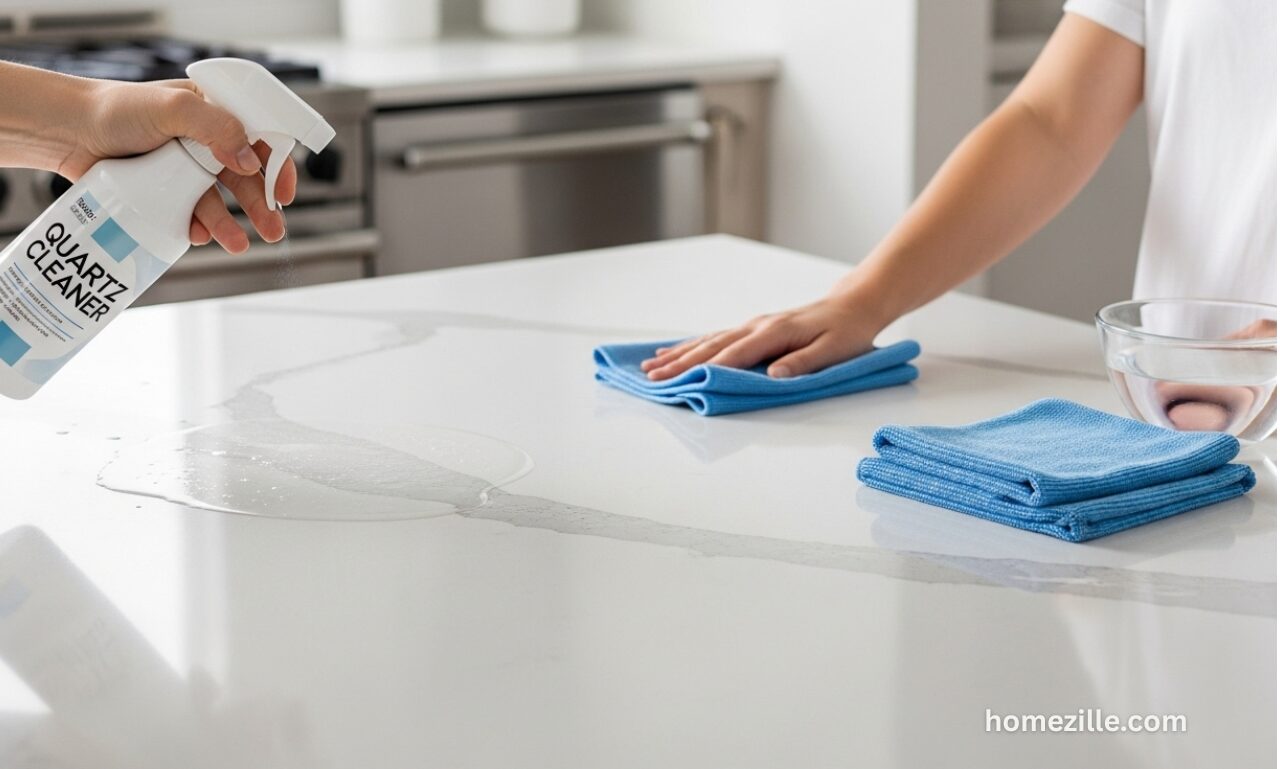If you’re thinking about how to clean quartz countertops without leaving streaks or haze, you’re not alone. Quartz is durable and low-maintenance, but the wrong products can dull its shine. This guide cuts through the conflicting advice with a safe, easy routine for spotless quartz—every day.
The 10-second daily routine (the thing most people skip)
- Wipe crumbs/dust first with a dry microfiber cloth so you’re not grinding grit into the surface.
- Wash with warm water + a drop of mild dish soap using a soft cloth or non-abrasive sponge; circular strokes, light pressure.
- Wash and dry with a clean towel to avoid water spots.
- This 10-second habit is what separates glossy quartz from “why does it look cloudy?” quartz.
Why it works: The resin that binds quartz is tough but doesn’t love high-pH/low-pH extremes or abrasives. Gentle cleaning preserves that smooth factory sheen.
Simple gear list (everything you need)
- 2–3 microfiber cloths (washable, lint-free)
- Soft sponge (non-abrasive)
- Mild dish soap
- Plastic scraper or old gift card
- Small spray bottle with 1:1 isopropyl alcohol + water for occasional disinfecting
- Trivets and cutting boards you’ll use
How to Clean Quartz Countertops Step-by-Step
A practical workflow you can save and stick in your fridge.
1) Everyday wipe-down (30–60 seconds)
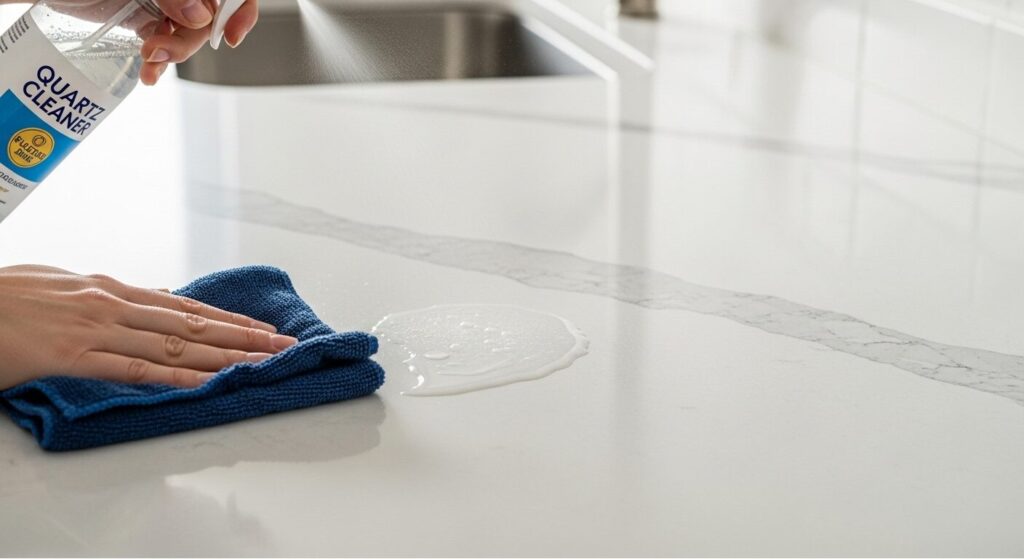
- Dry wipe to lift grit.
- Place a little bit of soft dish soap in warm water.
- Wipe in circles; don’t scrub hard.
- Rinse and dry.
2) After cooking: degrease without dulling
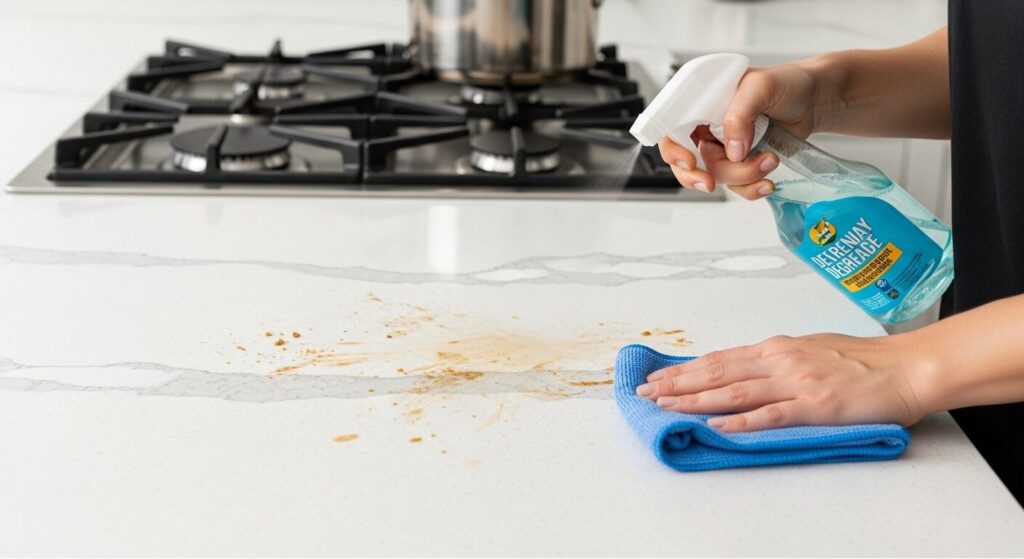
- For cooking oil spatter or greasy film, use a light, manufacturer-approved multipurpose cleaner (409-type) or dish-soap solution; wipe, rinse, dry.
3) Sticky, gummy, or paint-pen spots
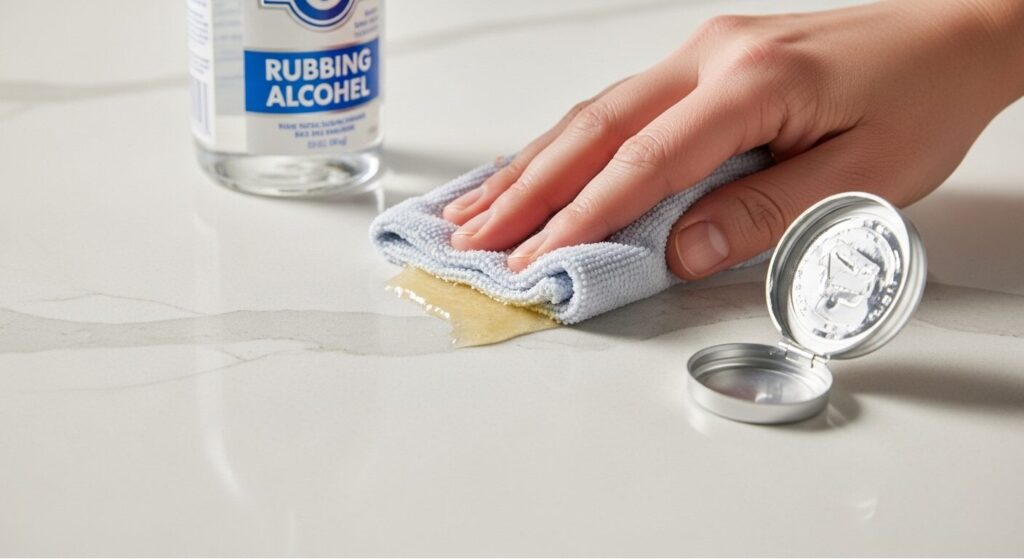
- Plastic scraper at a low angle first (old gift card works).
- Mist with isopropyl alcohol (rubbing alcohol) + water (1:1), let sit 2–3 minutes, then wipe, rinse, dry. Alcohol cuts residues without the harshness of stronger solvents.
4) Hard-water haze (around sinks/faucets)
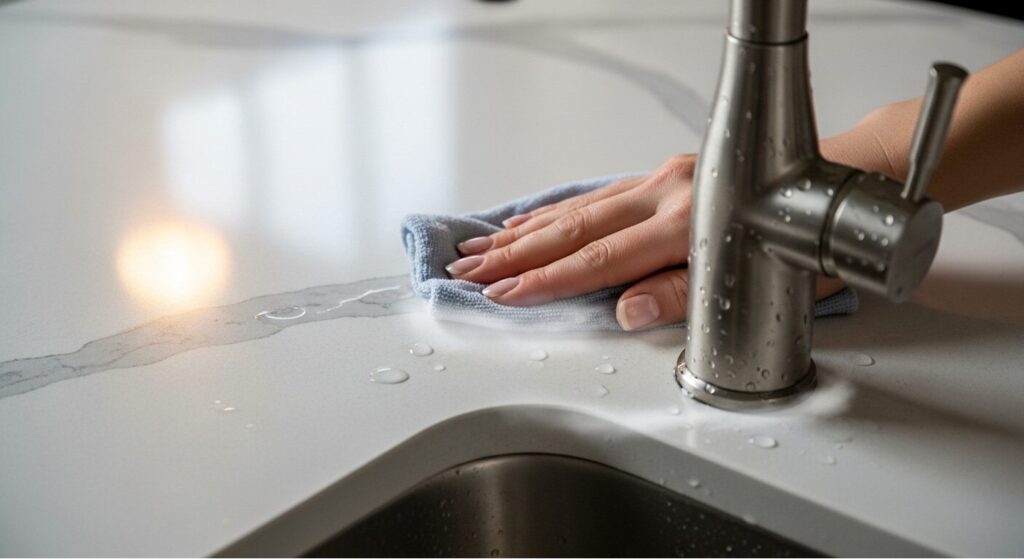
- Soak a microfiber with your regular soapy water; hold on the area 3–5 minutes; wipe, rinse, dry.
- If deposits persist, follow your brand’s guidance. (Some manuals allow specific methods; when in doubt, contact the manufacturer or your fabricator.)
5) Food stains that “won’t budge” (coffee, tea, turmeric)
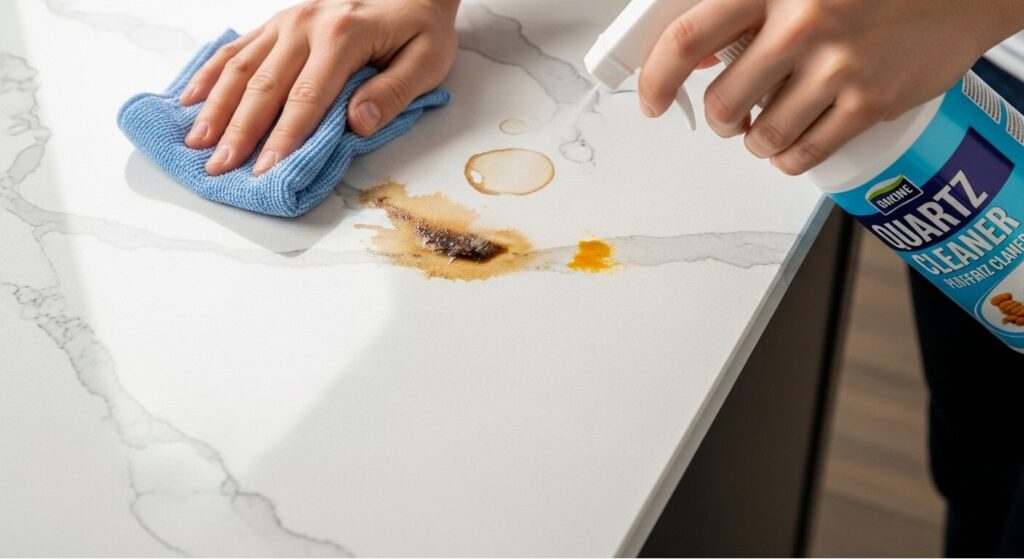
- Act fast: re-hydrate the spot with warm, soapy water; let it sit; wipe, rinse, dry.
- For lingering colour, repeat with the alcohol mix above. Avoid abrasive powders. If still visible, check your brand’s stain guidance or call a pro.
Important: You’ll see viral tips about magic powders and acidic pastes. Quartz is non-porous, so most stains are surface-level films. Power-scrubbing can leave micro-abrasion that looks like a permanent “cloud.”
What not to use (and why)
- Abrasive powders/pads (Comet/Ajax, steel wool, scouring pads): leave micro-scratches and haze.
- Harsh chemicals (oven cleaner, paint strippers, strong solvents) can attack the resin binder.
- Regular bleach soaks or frequent Clorox wipes: harsh; can dull/discolour with repeated use. (If a manual allows a specific product in exceptional cases, follow that manual precisely.)
- Placing hot pots/pans directly: risk of thermal shock or resin discolouration; always use trivets.
- Cutting directly: quartz is scratch-resistant, not scratch-proof; always use boards.
Is Vinegar or BKF Safe for Cleaning Quartz Countertops?
You’ll encounter conflicting advice online—even from big names—about vinegar and Bar Keepers Friend (BKF) on quartz.
- Some brand content/articles say a water-vinegar mix is okay; others caution against acids on engineered stone. Results vary by resin chemistry and finish.
- BKF has multiple products. Homeowners report damage when using powder/abrasive BKF on quartz; however, BKF’s Granite & Stone cleaner is positioned for polished stone/quartz (non-abrasive spray)—again, different product, different outcome. When in doubt, follow your slab brand’s manual and spot-test.
Major manufacturers publish care PDFs and pages—use those as your tie-breaker because warranties sometimes hinge on following their guidance. Bottom line: if you’re unsure how to clean quartz countertops with a product you found on TikTok, check your brand’s care page first, or do a 10-minute spot test on a hidden edge.
Disinfecting quartz without ruining the finish
For everyday kitchens, you don’t need hospital-grade disinfectants. After cleaning with dish soap:
- Mix isopropyl alcohol + water (1:1), lightly mist, sit 2–3 minutes, then rinse and dry.
- Skip routine bleach soaks; if your brand allows a specific disinfectant (e.g., 409-type), follow their directions precisely.
Weekly & seasonal deep-clean schedule
Weekly (5 minutes)
- Full clear-off, wash with dish soap + warm water, rinse and dry.
- Check edges, sink cutout, and faucet base for early mineral buildup.
- Quick alcohol spritz if you want a hygienic finish after raw-meat prep.
Monthly (10 minutes)
- Pull small appliances forward and clean behind/under them.
- Inspect for tiny chips near the sink/cooktop; if you see one, call your fabricator before it grows.
Seasonal (spring/fall reset)
- Declutter, evaluate cutting boards/trivets (replace if warped/melted).
- Review your brand’s latest care bulletin—manufacturers occasionally update guidance.
Stain & problem solver
Coffee/tea shadow
- Soapy water compresses 3–5 minutes → wipe → alcohol spritz → rinse/dry.
Turmeric/curry colour cast
- Repeat above; don’t jump to abrasives. If it lingers, contact the brand; colourants can cling to residue rather than the slab itself.
Grease film
- Dish soap or brand-approved degreaser (409-type), rinse/dry.
Hard-water ring
- Longer soapy-water dwell, soft wipe, rinse/dry; escalate only per brand guidance.
Adhesive/goo from labels
- Plastic scraper first; then alcohol spritz; wipe, rinse, dry. Avoid acetone/strong solvents unless your brand explicitly allows (many do not).
Dull/hazy patch
- Likely from an abrasive or harsh chemical. Stop using the product; clean gently for a week to see if it’s film. If etched/hazed, call a pro/fabricator.
Brand differences matter (Silestone vs. Caesarstone and others)
Quartz is engineered stone: crushed quartz + resin + pigments. Formulations, finishes, and coatings differ; so do care sheets.
Silestone (Cosentino)
Routine soap-and-water; avoid strong chemicals/solvents; follow their stain/grease guidance (they reference specific cleaners).
Caesarstone
Endorses gentle daily cleaning; their docs have varied over time about specific products. Always defer to the current care page for your colour/finish.
Action step: Find your brand + colour name on the invoice, bookmark the care page, and keep a screenshot for warranty purposes.
The “don’t panic” guide for common mistakes
Used abrasive BKF/Comet one time
Rinse thoroughly; switch to gentle cleaning for a week. If the spot looks uniform after a few cleans, it is residue; if it stays dull, call a pro.
Tried vinegar everywhere
Blot, rinse with soapy water, and dry. Watch for dulling on dark/low-sheen finishes; discontinue if you notice it. (Many owners avoid acids entirely.)
Set a hot pot down
If you see a light ring, it may be heat damage. Document it and call your fabricator—do not try harsh fixes.
Final tips for cleaning quartz countertops safely
If you remember one thing about how to clean quartz countertops, it’s this: keep it gentle, keep it quick, and keep heat and harsh chemicals off your surface. Daily dish soap + warm water, a soft cloth, and good habits (trivets, boards, fast spill cleanups) will keep your counters looking new for years—and you won’t waste money on complicated routines. For edge cases, your brand’s care page is your best friend.
Frequently Asked Questions
1) Can I use Clorox wipes on quartz?
Not as a daily habit. They’re convenient but can be too harsh with frequent use and may dull the finish over time. Clean with soap and water first; use gentler disinfecting (alcohol mix) when needed.
Source
2) Is vinegar safe on quartz?
Opinions differ. Some articles permit diluted vinegar; many homeowners and pros avoid acids entirely to protect the resin/finish. If you’re tempted to try it, spot-test in a hidden area and consult your brand’s care page.
Source
3) Is Bar Keepers Friend okay?
Avoid abrasive BKF powders on quartz; people have reported hazing. BKF’s Granite & Stone Cleaner & Polish is marketed as quartz-safe, but always verify and spot-test. Brand policy wins if there’s a conflict.
Source
4) Can you apply Windex to quartz surfaces for cleaning?
Yes, you can use a gentle spray like Windex to clean quartz countertops. But don’t use any spray that has vinegar in it because it’s too harsh for the stone.
Source

